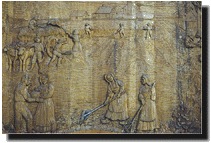
The first Europeans to settle on the
Island were of French descent: Acadians who had colonized
what is now Nova Scotia in the early 1600s. After losing
Acadia and Newfoundland to the British, France encouraged
the Acadian farmers to move to Isle-Saint-Jean (Prince
Edward Island) in an effort to support the French
fortress at Louisbourg on Isle Royale (Cape Breton).
 The
first Acadian and French colonies were settled in 1720,
at Trois Rivieres (Brudenell), Havre-Saint-Pierre (St.
Peters), Havre-aux-Sauvages (Savage Harbour), Tracadie,
Malpeque, Pointe de l’Est (East Point), Riviere du
Nord Est (Hillsborough River) and Port LaJoye. Over the
next 35 years, the Acadian population grew and developed.
However, the progress of this community-minded people
took a tragic turn in 1755 and again in 1758 when the new
British governors expelled the Acadians from the Atlantic
colonies. In 1755, 6,000 Acadians were deported from Nova
Scotia. Of the 4,000 who escaped, half went into hiding
and half sought refuge on the Island. Three years later,
3,000 Acadians were expelled from Prince Edward Island.
Many of those deported to France perished when two
vessels sank during the transatlantic crossing.
The
first Acadian and French colonies were settled in 1720,
at Trois Rivieres (Brudenell), Havre-Saint-Pierre (St.
Peters), Havre-aux-Sauvages (Savage Harbour), Tracadie,
Malpeque, Pointe de l’Est (East Point), Riviere du
Nord Est (Hillsborough River) and Port LaJoye. Over the
next 35 years, the Acadian population grew and developed.
However, the progress of this community-minded people
took a tragic turn in 1755 and again in 1758 when the new
British governors expelled the Acadians from the Atlantic
colonies. In 1755, 6,000 Acadians were deported from Nova
Scotia. Of the 4,000 who escaped, half went into hiding
and half sought refuge on the Island. Three years later,
3,000 Acadians were expelled from Prince Edward Island.
Many of those deported to France perished when two
vessels sank during the transatlantic crossing.
Approximately 30 families managed to remain hidden on the
Island until the 1763 treaty. When they attempted to
return to their lands, they found that the British had
appropriated the land, divided it into lots, and
distributed them to court favourites. The Acadians were
now forced to pay rent on the land they had inhabited for
generations. The Tignish-Cascumpec Acadians, like their
compatriots in other communities, struggled with tenancy,
exorbitant rents, debts, and difficult relationships with
unreasonable or absentee landlords.
The Rustico (Lot 24) families also saw great hardship but
the arrival of Father George-Antoine Belcourt signalled a
great improvement in farming and business life for the
community. The institution he founded, the Farmers’
Bank of Rustico, issued its own currency that was
accepted throughout the Maritimes. It proved to be
Canada’s first people’s bank, and an
inspiration for the Desjardins Credit Union movement.
What is now known as “the Evangeline Region”
came to be settled by Acadians from Malpeque who left Lot
17 when relations with their landlord became intolerable.
In 1812, they founded “La Roche” (Egmont Bay)
and Grand Ruisseau (Mont Carmel). In 1817, Colonel
Compton sold to his remaining 15 Acadian tenant families
6,000 acres of lowland, in what is now Miscouche.
Culturally and politically, the Acadians encountered many
difficulties, only acquiring the right to vote and sit in
the legislature in 1830. And, for many years, the French
language held an inferior status to English, the language
of politics and commerce. Moreover, as the role of
government grew, Acadians lost control over education in
their communities and the process of Anglicization began.
In spite of these obstacles, the Acadians experienced
great progress. The co-operative movement, for example,
brought economic stability for farmers and fishers so
dependent on the elements and beholden to merchants and
processors. In reaction to this, in 1924, fishermen in
Tignish created Canada’s first ever fishermen’s
co-op, which later contributed to the development of the
Antigonish Movement. Co-operatives still play a vital
role in the Island’s Evangéline Region.
Today, French-speaking Islanders (representing four
percent of the province’s population) enjoy two
schools: École Évangéline, in Abrams Village and
École Francois Buote, in Charlottetown. Nonetheless,
these institutions were hard-won, and the battle for
education in French wages on for Francophones in some
Island communities, such as Summerside. Almost a quarter
of Prince Edward Island’s population has some French
ancestry and Anglicization remains an important issue.
However, schools and organizations such as La Société
St-Thomas-d’Aquin play an important role, not only
in slowing down assimilation, but in contributing to the
vibrancy of the Acadian culture in Prince Edward Island.
Link to the Acadian Anthem ![]()
Link to Acadian names
The Irish | Multiculturalism | The English
The Mi’kmaq | The Scots
